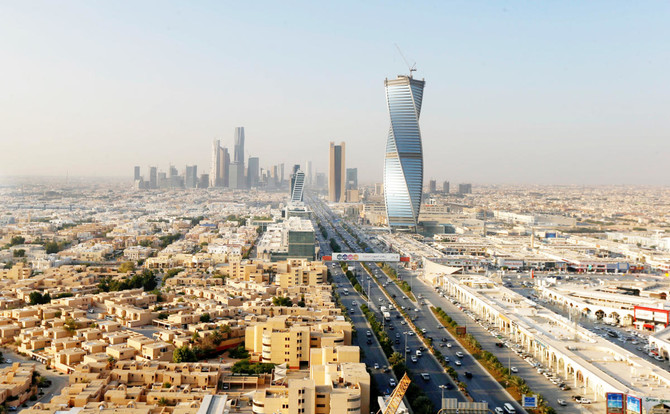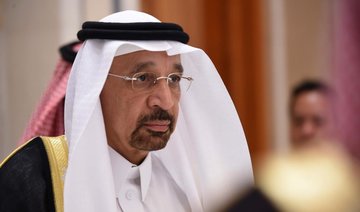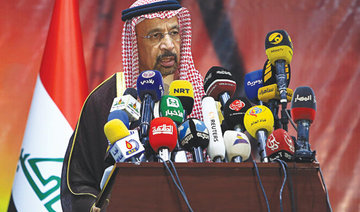RIYADH: With the hike in fuel prices effective as of midnight Sunday, the Ministry of Commerce and Investment (MCI) intensified its control on fuel stations across the Kingdom to ensure availability of petroleum products at prices fixed by the government.
The regulatory authorities were constantly monitoring markets to ensure that prices were not manipulated and supplies not interrupted in view of the increase. After the hike, 91 octane will now sell for SR1.37 ($0.37) per liter, up from 75 halalas per liter, whereas 95 octane will now sell for SR2.04 per liter, up from 90 halalas per liter. Notably, the new prices also include the value-added tax (VAT), which is being levied from Monday.
Moreover, diesel rates for transport and kerosene rates were left unchanged as the Ministry of Energy, Industry and Mineral Resources explained on Monday its financial balance plan and the aim of reducing the rapid growth in domestic consumption of energy products and efficient energy use in line with Saudi Vision 2030, which seeks to diversify the economy and sources of revenue away from oil.
Speaking to Arab News on the government plan on efficient use of energy coinciding with an ambitious reform plan to diversify income, Hesham Alghannam, a Saudi analyst, Fulbright scholar and a consultant on Middle East and North Africa (MENA) and Gulf affairs, said: “I have been saying for a while now, it would not be difficult for the state to push for cultural and social change. However, the challenge remains in the implementation of economic reform, as the economy is always complicated.
“It is not something that you can predict easily. I think that trial and error is one way to do it. At least there is a serious will to change and reform for betterment.”
Alghannam also pointed that the Saudi private sector is not capable of being a part of the solution. There are a number of reasons for this: First, the Saudi “private” sector is not genuinely private, most of its activities are recycling the oil rent, and it is to this extent hard to conceive of it purely as a profit or job creator. Second, the needs of the private sector are poorly aligned with the internal job market. This is shown by the difficulties in recruiting sufficient numbers of Saudi youth to certain jobs. Ultimately, the private sector is driven by its balance sheet and its profit and loss account.
“I also agree that the corruption purge will put a lot of weight on Crown Prince Mohammed bin Salman’s shoulders, because people see him as a determined man in dealing with officials that have been corrupted into inaction,” Alghannam told Arab News.
He added: “We have to wait and see, but without a doubt, the anti-corruption campaign in Saudi brings hope to the people that did not exist in the past. Such change is a golden opportunity to illustrate what the Saudi Vision can bring to the people.”
Dr. Majed bin Abdullah Al-Hedayan, an analyst, FDI expert and a legal adviser, told Arab News: “The Ministry of Energy, Industry and Mineral Resources announced on Monday the hike in the price of gasoline and its derivatives in the Kingdom... They also require the consumer to re-arrange their daily life and save energy as much as possible.”
Saqib Hamza, a recruitment executive from Dammam, told Arab News: “Saudi Arabia is the country with the lowest fuel price in the world. This hike will help in optimum energy utility and help cut on excess expenditure.” The advent of public transport, work on which is in fast progress, will help cut on expenditure for daily transport needs, he added.
Hike in gasoline prices across KSA will help in govt plan for efficient energy use: Experts
Hike in gasoline prices across KSA will help in govt plan for efficient energy use: Experts

Crown prince donates SR1bn for Saudi housing projects

RIYADH: Saudi Crown Prince Mohammed bin Salman pledged an SR1 billion ($266 million) donation on Monday to support housing projects for Saudi beneficiaries.
The donation at his own private expense to the National Development Housing Foundation aims to help beneficiaries achieve home ownership.
It reflects the prince’s “continuous attention and support for providing a decent life for citizens, by supporting the initiatives and projects aimed at providing housing for them in various regions of the Kingdom,” the Saudi Press Agency reported.
The crown prince’s directive states that the housing projects designated for donation be completed within a period not exceeding 12 months, and that they are implemented by national companies.
He also ordered authorities to submit monthly reports on the progress of home ownership, in order to ensure the handover of all housing units within one year.
Mangrove scheme to plant 3m trees in Jubail

RIYADH: The National Center for Wildlife and the Saudi Arabian Mining Co., known as Maaden, have launched an initiative to plant 3 million mangrove trees in the Jubail Marine Protected Area.
It supports the goals of the Saudi Green Initiative and Vision 2030 to enhance coastal vegetation and preserve biodiversity, the Saudi Press Agency reported on Monday.
The project aims to rehabilitate degraded habitats and strengthen the role of mangrove trees in carbon sequestration, as they are among the most efficient plants in storing carbon dioxide.
This helps combat climate change, protect coastal areas from erosion and provide safe environments for marine species reproduction, the SPA reported.
Mohammed Qurban, CEO of the National Center for Wildlife, highlighted the organization’s commitment to protecting ecosystems and expanding vegetation cover.
These efforts align with the Saudi Green Initiative’s target of planting 10 billion trees, including more than 100 million mangroves along Saudi coasts, reinforcing the Kingdom’s global environmental leadership, he said.
Saudi FM discusses US-Iran talks with Iranian counterpart

RIYADH: Saudi Foreign Minister Faisal bin Farhan discussed with his Iranian counterpart Abbas Araghchi the latest developments in US-Iran talks via a phone call, the Saudi Foreign Ministry said on X.
Prince Faisal received a phone call Monday from Araghchi during which they discussed the third round of negotiations between the United States and Iran, which was held Saturday in the Omani capital Muscat.
The ministers also discussed bilateral ties and issues of common interest, the ministry statement added.
سمو وزير الخارجية الأمير #فيصل_بن_فرحان @FaisalbinFarhan يتلقى اتصالاً هاتفياً من معالي وزير خارجية الجمهورية الإسلامية الإيرانية السيد عباس عراقجي. pic.twitter.com/9mwbuNMMB4
— وزارة الخارجية (@KSAMOFA) April 28, 2025
Thousands of refugees in Jordan’s Zaatari camp receive treatment from KSrelief in March

- Thousands seen in Zaatari refugee camp for Syrians in Jordan by KSrelief healthcare volunteers
RIYADH: Thousands of people in the Zaatari refugee camp for Syrians in Jordan received healthcare services in March, the Saudi Press Agency reported on Sunday.
Of the 8,428 patients seen by KSrelief carers, general medicine clinics treated 2,657 patients, while the internal medicine clinic dealt with 454 patients suffering from diabetes, hypertension, and asthma.
The pediatric clinics received 668 patients, and the dental clinic attended to 542 patients.
Additionally, the two gynecology clinics welcomed 649 women, while the ear, nose and throat clinic treated 210 patients.
The ophthalmology clinic saw 242 patients and the cardiology clinic attended to 64 patients.
The diagnostic radiology clinic served 123 patients and the dermatology clinic treated 133 patients.
Moreover, the rehabilitation medicine clinic assisted 106 patients.
Throughout the month, 7,204 laboratory tests were conducted for 814 patients, and 701 imaging procedures, including X-rays and ultrasounds, were performed for 627 patients. The vaccination clinic administered 487 vaccines.
There were 241 health education sessions, both individual and group, and 411 physical therapy sessions were conducted.
The pharmacy handled 5,212 prescriptions during this period.
KSrelief team perform 11 cochlear implant procedures on children in Tunisia

- Speech and language rehabilitation services were also provided for 11 children
RIYADH: A volunteer medical team from the Saudi aid agency KSrelief performed 11 cochlear implant operations on children in Tunisia, the Saudi Press Agency reported on Monday.
Speech and language rehabilitation services were also provided for 11 children, and 11 educational sessions were organized for the children’s families, benefiting 22 individuals, according to the report.
The procedures, carried out by 10 medical volunteers, were part of the “Saudi Hearing” volunteer program for cochlear implants and auditory rehabilitation in Tunisia.





















